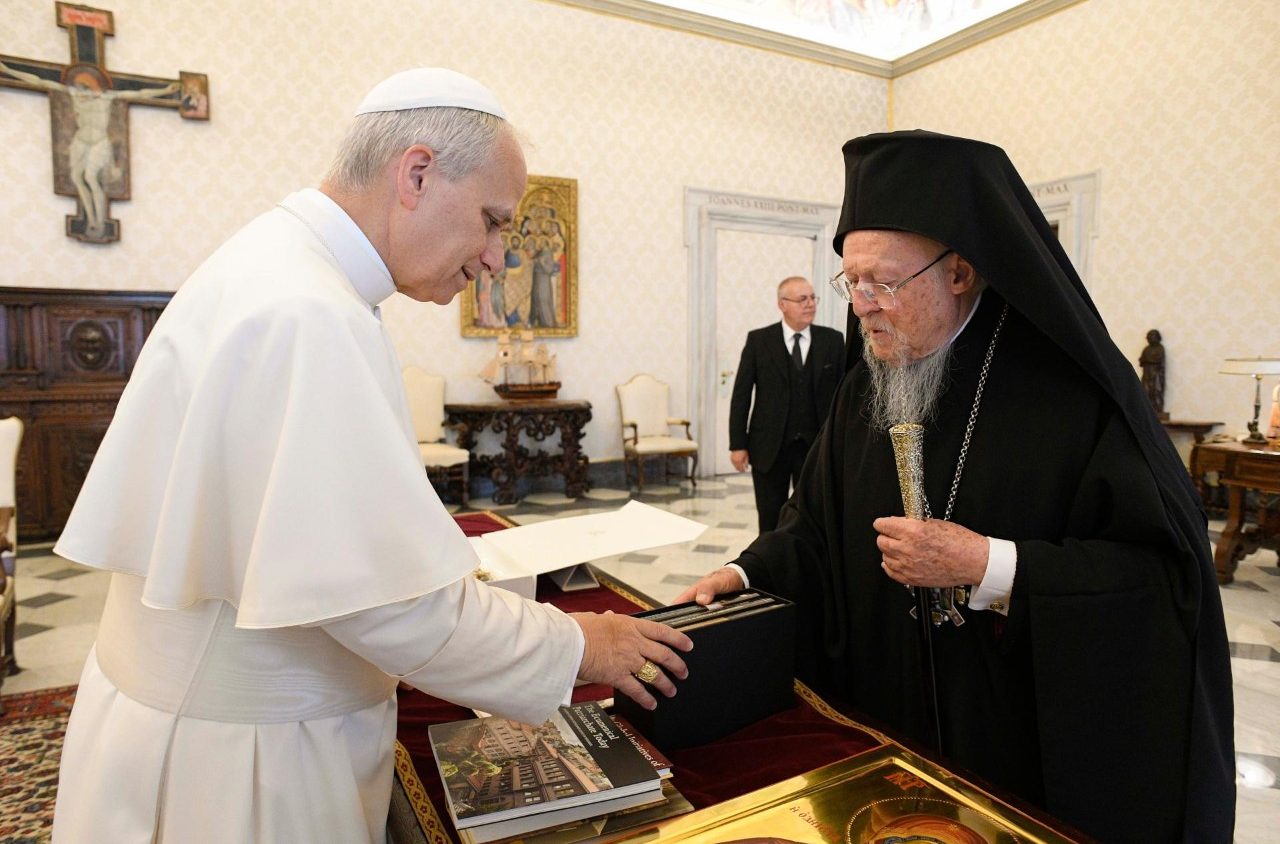🇮🇹 Versione italiana
Vatican City – This morning, in the Apostolic Palace, Pope Leo XIV received in audience the Representatives of other Churches and Ecclesial Communities, as well as those of other religions, who had gathered in Rome on the occasion of the inaugural Mass of his petrine ministry. The encounter, marked by a spirit of great cordiality and attentive listening, represented the first significant ecumenical and interreligious gesture of the new Pontiff. In his address, Leo XIV first expressed his gratitude for the presence of so many religious figures, including His All Holiness Bartholomew, His Beatitude Theophilos III, and His Holiness Mar Awa III, emphasising how their closeness and prayers are for him “a great comfort and encouragement”.
Christian unity: a priority for the Bishop of Rome
Recalling the 1700th anniversary of the Council of Nicaea, the Pope highlighted the importance of the Creed shared by all Christians, identifying the pursuit of full visible communion as one of his pastoral priorities: “As Bishop of Rome, I consider one of my priorities to be that of seeking the re-establishment of full and visible communion among all those who profess the same faith in God the Father, the Son and the Holy Spirit.” At the foundation of this commitment, Leo XIV recalled the mottoof his episcopal ministry: In Illo uno unum, taken from Saint Augustine, which encapsulates the belief that Christian unity stems from shared obedience to Christ: “The more faithful and obedient we are to him, the more united we are among ourselves.”
Synodality and ecumenism: two interwoven paths
The Pontiff then underscored the close link between synodality and ecumenism, reaffirming his intention to continue the ecclesial reform initiated by Pope Francis. He expressed his determination to develop new forms of ecumenical synodality, with the aim of involving the different Christian denominations in a shared journey of listening, co-responsibility, and Gospel witness.

Interreligious dialogue: building bridges in a wounded world
Widening his focus, Leo XIV expressed appreciation for the representatives of other religions, who share “the search for God and for his will, which is always and only a will of love and life.” He recalled how the dialogue promoted by his predecessor had opened “new avenues of encounter”: “The culture of dialogue as the path; mutual collaboration as the code of conduct; reciprocal understanding as the method and standard.” A special thank you was extended to the Dicastery for Interreligious Dialogue, praised for its patient work in fostering relationships based on human fraternity.
Jews and Muslims: relationships to cherish and deepen
The Pontiff also devoted considerable attention to relations with Judaism and Islam. Speaking of the Jewish people, he emphasised the deep bond uniting Christians and Jews, stating: “Theological dialogue between Christians and Jews remains ever important and close to my heart.” Leo cited the conciliar declaration Nostra aetate, which encourages mutual knowledge and esteem between the two faiths. Likewise, he praised the Church’s approach to Islam, grounded in mutual respect and the recognition of Muslimsas worshippers of the one God, recalling the Council’s words: “The one God, living and subsistent, merciful and almighty, Creator of heaven and earth, who has spoken to humanity.”
A shared commitment to peace and justice
Finally, Leo XIV made a heartfelt appeal for all religions to unite in a common effort for peace in the world and the care of creation. In an age marked by wars, injustice, and environmental devastation, the Pope urged all to speak out together against destructive ideologies: “If we are in agreement, and free from ideological and political conditioning, we can be effective in saying ‘no’ to war and ‘yes’ to peace, ‘no’ to the arms race and ‘yes’ to disarmament, ‘no’ to an economy that impoverishes peoples and the Earth and ‘yes’ to integral development.”
The Pontiff concluded his speech with a blessing and a word of thanks: “The witness of our fraternity […] will certainly contribute to building a more peaceful world […]. Let us invoke in our hearts the blessing of God […] that hope may grow in the world.”
A beginning marked by dialogue
With this address, Leo XIV reaffirmed his desire to embody a petrine ministry committed to strengthening bonds of unity, sustaining the synodality envisioned by Saint Paul VI, expanding interreligious dialogue, and bearing witness to peace as the fruit of genuine spiritual fraternity. A beginning that decisively reaffirms the Church’s vocation to be a bridge and leaven of reconciliation among peoples and faiths.
T.S.
Silere non possum